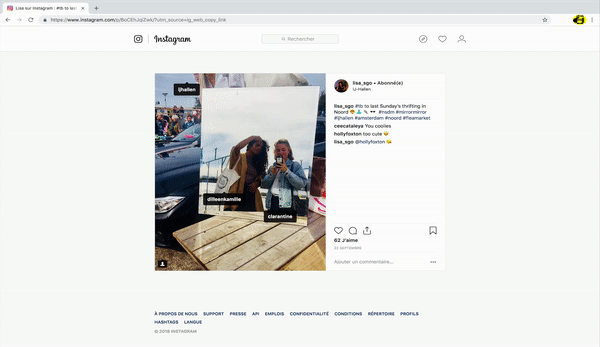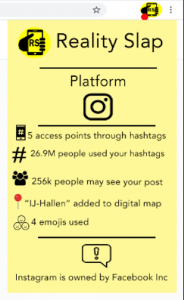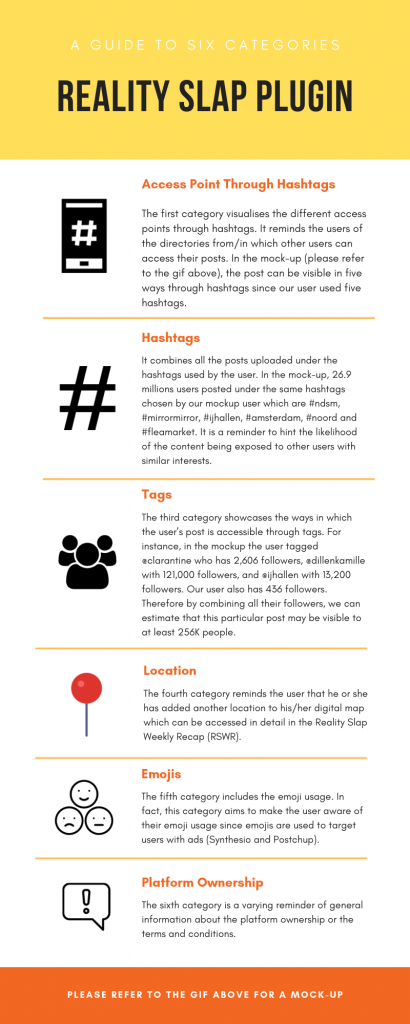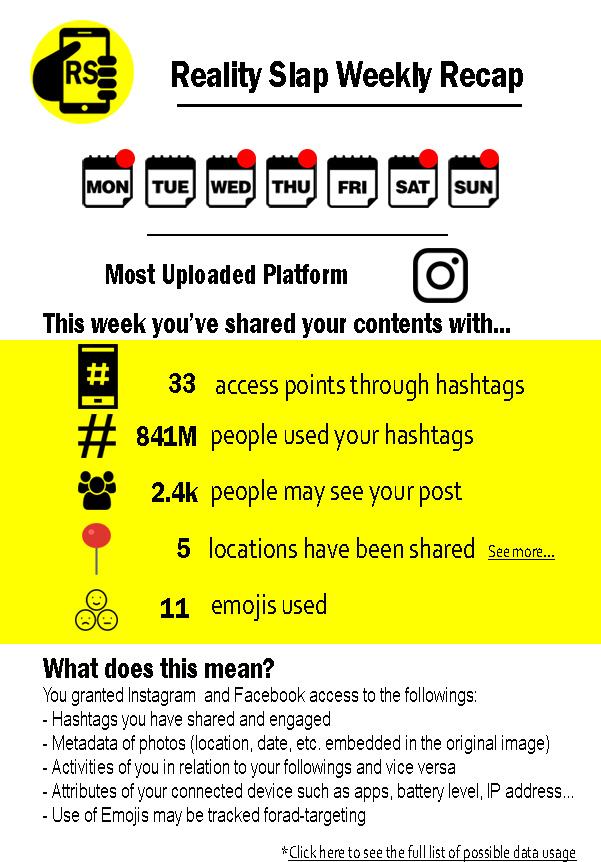Reality Slap Plugin: You Never Know When It Hits You
With the number of Tweets, Facebook statuses, Instagram pictures and Stories many users share on a daily basis, we think it can be exhausting to keep track of the wide-ranging visibility a single post can have. With a public profile on social media platforms users not only show their faces to the world but also give away information about their personal interests, their friends and family, and their location.
The relevant debates around privacy issues and datafication have been going on for years and culminated in the General Data Protection Regulation (GDPR) recently passed by the EU. However, the public discourse is generally focused either on the economic level concerning Silicon Valley giants commodifying our data or on the legislative context as was the case with the GDPR. These discussions and new regulations are without a doubt extremely pertinent, yet we still find users being indifferent to their exposure online. We suggest that the discussion should not be limited to the political and economic realm but also include the personal usage of social media to account for this privacy paradox (Kokolakis 122; Stutzman et al. 330).
The question is – how can users establish a new understanding of their online presence and become more aware of their data sharing habits? The platforms’ analytics and terms of use merely inform their users about who engaged with their posts as well as what data they allowed the platforms to use. Therefore, we think there needs to be a tool that slaps them in the face immediately after posting, raising awareness of users’ actual visibility online.
This is why we created the Reality Slap Plugin. Users who are interested in receiving a quick reminder of the range of visibility of their posts without having to check analytics (which is not available for everyone) and without having to read through the terms of use, should install the Reality Slap Plugin and subscribe to its weekly recap.
The Motivation of the Project
Engaging with the privacy mentioned above paradox and relevant debates in the new media field, we established the following question: How can a plugin serve as a critical intervention in the privacy-paradox currently prevalent in users’ data sharing on social media networks? Therefore, our project wants to make the users critically aware of their visibility online through visual reminders in order to better grasp the scope of their sharing practices.
The Reality Slap Plugin is offering a constant reminder of shared data on the leading social media platforms regarding the privacy paradox. The term refers to the increasing discrepancy between users’ attitudes towards privacy and actual behaviour online. “Surveys show that privacy is a primary concern for citizens in the digital age. On the other hand, individuals reveal personal information for relatively small rewards, often just for drawing the attention of peers in an online social network” (Kokolakis 122). All these shared data points lead to a personal profile online, which can later be utilised and datafied by the platforms. In prior theories on social media, metadata was considered a secondary result of social networking. However, the proliferation of social media shed light on the value of such data resulting in the emergence of new purposes. That is the predictive and real-time analysis also known as the concept of datafication (Van Dijck & Poell 9). Social media usage generates metadata that is automatically monitored and collected (Joler et al. n. pag). Users might not understand the scope of these issues as metadata remain an abstract concept to them while at the same time being very tangible for the platform itself or “third parties, be it fellow users, companies, government agencies, or other platforms” (Van Dijck 199) leading to a privacy-paradox that is not acted upon.
In light of the new European regulations as well as the current political discourse, the project tries to take the issue of dataveillance from a legislative and economical to the personal level of the user. With this project we propose that self-tracking, in the form of a plugin, maybe a step for users towards more awareness.
The Plugin: How does it work?

The Reality Slap Plugin does not mean to act as a determining force for what to share and what not to share. It is instead a reminder of the visibility of each posting in terms of shared data. In fact, the plugin can also be used to optimise the exposure for users that aspire more engagement on their profiles. In other words, the project itself is built around the aforementioned concept of privacy paradox, thus leaving versatile purposes of the plugin up to the users.
The Reality Slap Plugin can be downloaded as a simple pop-up version as well as an account version which provides a weekly digest service named Reality Slap Weekly Recap (RSWR). To account for privacy issues, the second version will ask a user to create a personal account and allow the plugin to create a summary of user activities each week.
The plugin will send push notifications on the web browser every time a user posts on a social media platform. Different categories are supposed to differentiate the shared data visually and the RSWR will allow users to get a more in-depth understanding of the implications of issues related to privacy, visibility and datafication. The following mock-up is focused on Instagram, although the plugin itself could work on other big social media platforms such as Facebook and Twitter as of the envisioned functionality right now.
A Guide to Reality Slap Plugin
The Notification

Fig 1: Reality Slap Plugin mock-up in action

Fig 2: Pop-up in detail
As soon as a post is shared, regardless of the device, the plugin sends a push notification which appears on the browser as a red dot. The goal is to have a non-invasive visual reminder. The user could choose to ignore. If the user chooses to click on the plugin icon for more details, a visual card index is rolled down. The card index offers insights about the platform and the user’s post divided into six categories.

Fig 3: Six categories of the pop-up
Reality Slap Weekly Recap
Along with the web plugin, we decided to create the ‘Reality Slap Weekly Recap (RSWR)’, which users can subscribe to by providing their emails. While the plugin serves as an instant reminder, RSWR provides an overview of user’s weekly activities and sharing practices such as the number of posts, the most used platform, and general information about the data shared on the platform. This concentration of insights in a weekly digest prompts the user to understand the scope of their shared content better. , A comprehensive non-interactive location map shows the user their whereabouts throughout the week in relation to their posted locations on the social media platform, to add another visual component to the RSWR. It allows the user to realise their geographical data shared with not only the users but the platform and consequently other third parties.

Fig 4: Reality Slap Weekly Recap Mock-up

Fig 5: Non-interaction location map
The list of possible data usage by the platform and third parties is created based on the Data Policy of the platform to shed light on what is often not clearly presented to the users; how platforms may use data. It is important to note that the list of possible data usage in Fig. 4 is not exhaustive. Different variables will be included in each RSWR to raise awareness as to what kind of personal data can be shared with users as well as third parties through the engagement with the platform. For example, RSWR will inform users of possible data usages by the platforms and third parties. For instance, they have access to metadata such as geo-tag, date embedded in the original image, IP address, list of installed apps and battery level (Instagram Data Policy). The decision of including a varying portion of the platform’s Data Policy in each weekly recap, instead of an exhaustive list is implemented based on studies that question the efficacy of the current ‘notice and consent’ in terms of privacy data policy. Many critics argue that the sheer amount of interactions users make across online platforms as well as the complexity of terms and conditions make it difficult to understand and assess the privacy policy of the platform, resulting in users’ inattentive action to accept the policy (Yeung 125). By sparsely presenting a set of possible data usages in relation to data shared by the user in the given week alongside the weekly activity summary, RSWR hopes to help users assess the degree of one’s privacy sharing practice and make sense of the policy better.
Limitations and Outlook
While we see the possibilities and opportunities of the plugin for users, we also account for possible critiques regarding the project. Considering the purpose of the plugin, it could be understood as a solutionist approach to the complex and far-ranging topics we have touched upon. The Reality Slap Plugin could indeed be seen as another technical gadget trying to find “computable solutions” (Morozov 16). On the one hand, the plugin cannot inform beyond its limitations, while on the other it might give a false sense of control.
Privacy concerns within the plugin itself will be a significant obstacle to face – the plugin will require some of the users’ information such as email address for the RSWR. Therefore, the users would have to trust the Reality Slap Plugin, just as they trust other platforms and networks the plugin is operating within. However, the plugin tries to partly counter these concerns, offering two different usage options.
Furthermore, we came across several limitations for the plugin in terms of accessing particular information from the networks. Our original aspirations for the plugin aimed to provide information on the specific metadata (such as the location embedded in the original post) shared by users and allowing them access to insights on how the platform use these data. However, the platforms delete these metadata and render them inaccessible for other users even though they are collected by the platform. In this sense, the platform operates as a black box.
Not only on the meta-level but also on the surface there is limited access to the information users as well as the plugin can retrieve concerning the visibility of a post. The platform acts as a gatekeeper by reinforcing the visibility of some posts and hindering others (Gillespie, 352). For instance, the new function on Instagram enabling users to follow hashtags does not specify the number of followers of that particular hashtag. The function primarily suggests more visibility. Unfortunately, there is no way of knowing the exact followings of hashtags making an estimation impossible.
The terms of conditions as well as the API policies of networks like Instagram, Facebook and Twitter are a way of limiting all kinds of activities aimed at collecting data from their content: “You cannot use the API Platform to crawl or store users’ media without their express consent.” (Instagram Developer Platform Policy). While a lot of legal constraints can be seen as limitations for the plugin, Reality Slap Plugin still allows intervening in the privacy paradox in the form of a constant reminder of sharing private information. Since it ought to be a prompt to reconsider one’s online behaviour, it should not infringe any legal terms and conditions of the platform.
On the positive side, the plugin has the potential to be further developed and address some of the limitations above. Currently, it only considers featuring social media platforms such as Instagram, Twitter and Facebook accounting for the scope of the work. In the future, it would be possible to include different types of websites with an option to create personal accounts and content. Therefore, the plugin could include an extended metadata function to display location data of images and more, which is impossible on Instagram right now since the metadata is stripped after uploading. Hereby, it would accommodate the function formerly envisioned by the team to allow for a deeper understanding of personal content posted. Furthermore, we would like to integrate an alert in regards to changes in terms of services. While the plugin currently includes a regular reminder in the Weekly Recap of the terms of services, the alert would allow an immediate reaction to changes in privacy settings and other conditions regarding user content.
As another outlook, it would be a desirable integration to link the Reality Slap Plugin to the different platforms’ analytics services to allow for new categories and more metadata to be displayed through our service. Even though the analytics data are often attainable by the single user through the personal account, it takes a conscious effort to access and read them. Incorporating analytics into the plugin functions would provide immediate access to these metrics. In addition, the plugin would profit from the inclusion of private accounts in its service as for now it only works on public accounts. Regarding the further use of personal data through the platform, it would be very insightful to give information and statistics on third-party access to data.
Finally, we see multiple ways to improve and continue developing the plugin as a critical intervention for the users, who chooses themselves to engage with their online visibility, while at the same time tackling some of the above-stated limitations. Also, we do not intend to change user behavior with this plugin directly, nor do we think that we can analyse user behaviour due to its complexity.
References
Data Policy | Instagram Help Center. https://help.instagram.com/519522125107875/?helpref=hc_fnav&bc[0]=Instagram%20Help&bc[1]=Privacy%20and%20Safety%20Center. Accessed 22 Oct. 2018.
‘Emoji Analytics: A Social Listening How-To’. Synthesio, 1 Aug. 2016, https://www.synthesio.com/blog/emoji-analytics-social-listening/.
Gillespie, Tarleton. ‘The Politics of “Platforms”’. New Media & Society, vol. 12, no. 3, May 2010, pp. 347–64. Crossref, doi:10.1177/1461444809342738.
Instagram Developer Documentation. https://www.instagram.com/developer/. Accessed 22 Oct. 2018.
Joler, Vladan, et al. “Immaterial Labour and Data Harvesting Facebook Algorithmic Factory (1).”Share Lab 2016, 21 Aug. 2016.
Kokolakis, Spyros. ‘Privacy Attitudes and Privacy Behaviour: A Review of Current Research on the Privacy Paradox Phenomenon’. Computers & Security, vol. 64, Jan. 2017, pp. 122–34. Crossref, doi:10.1016/j.cose.2015.07.002.
Morozov, Evgeny. To Save Everything, Click Here. The Folly of Technological Solutionism. PublicAffairs, 2013.
Stutzman, Frederic, et al. ‘Privacy in Interaction: Exploring Disclosure and Social Capital in Facebook.’ ICWSM, 2012.
Van Dijck, Jose. ‘Datafication, Dataism and Dataveillance: Big Data between Scientific Paradigm and Ideology’. Surveillance & Society, vol. 12, no. 2, May 2014, pp. 197–208. Crossref, doi:10.24908/ss.v12i2.4776.
Van Dijck, José, and Thomas Poell. ‘Understanding Social Media Logic’. Media and Communication, vol. 1, no. 1, Aug. 2013, p. 2. Crossref, doi:10.17645/mac.v1i1.70.
Yeung, Karen. ‘“Hypernudge”: Big Data as a Mode of Regulation by Design’. Information, Communication & Society, vol. 20, no. 1, Jan. 2017, pp. 118–36. Crossref, doi:10.1080/1369118X.2016.1186713.